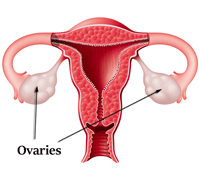Baby Powder Ovarian Cancer Risk Information for Residents of Tucson
The talcum powder cancer risk has been documented in major medical journals throughout the past four decades. The first inkling that talc increases women’s risk for ovarian cancer surfaced in a 1971 report, when a study of patients diagnosed with ovarian cancer revealed talc particles in ovarian tissues. Companies such as the cosmetics corporation Johnson & Johnson and talc mining company Luzenac America and its parent company Rio Tinto Materials, who manufacture and market talcum powder products including women’s body powder and baby powder, have argued against the connection between talc and cancer since that earliest finding. Despite numerous petitions to the FDA by medical experts and advocacy groups, the substance remains unregulated in the United States. Dr. Samuel Epstein, chairman of the Cancer Prevention Coalition, insists that the perineal use of baby powder is dangerous for women, in opposition to cosmetics marketing by Johnson & Johnson. Sharing the experiences of women who have suffered and died as a result of baby powder cancer, brought forward through talcum powder cancer lawsuits, may be the only way to finally effect restrictions on the substance.
Understanding the Science behind the Talcum Powder Cancer Connection

Talc, the key ingredient in baby powder, is a naturally-occurring mineral that is found throughout the world. Talc is a soft mineral comprised of magnesium, silicon and oxygen. The substance is mined, crushed, dried, and milled for use in consumer products. Talc is used for a variety of household and industrial purposes ranging a food additive, an anti-caking agent, a lubricant, and an astringent. In the case of baby powder, talc is renowned for its ability to absorb moisture, reduce friction and prevent rashes. Talc-based products have been marketed to women for genital hygiene purposes as body powder and genital deodorant sprays. Talc particles may also enter the female reproductive system through tampons, sanitary pads and diaphragms that are dusted with baby powder. Talc particles that reach the ovaries can result in the growth of ovarian cancer cells. Experts estimate that roughly one in five American women applies talcum powder to her genitals on a regular basis.
The decades of research on the role of baby powder in bringing about cancer cell development indicate that women who expose their genital area regularly to talcum powder products are three times as likely to develop ovarian cancer as women who refrain from baby powder use. Research indicates that talc particles in the ovaries cause an inflammatory response, which has a range of medical implications. Among these, inflammation in the ovaries can cause increased cell proliferation and damage to DNA, which can result in the malignant transformation of cells, or ovarian cancer. Talc is poorly soluble, meaning particles from baby powder can remain intact within body tissues for many years.
Baby Powder Ovarian Cancer Research Findings
Following the 1971 study that first detected a connection between talcum powder use and ovarian cancer, many more scientific studies have been published in prominent medical journals such as Cancer, The Lancet, and Oncology throughout the past decades. The National Cancer Institute and the International Union Against Cancer have published similar findings. A description of pivotal studies on the baby powder and ovarian cancer is set forth here:
- 1970s An article on ovarian cancer caused by talcum powder in The Lancet warns, "The potentially harmful effects of talc . . . in the ovary . . . should not be ignored."
- 1992 The Journal of Obstetrics and Gynecology publishes a study which finds that regular (weekly) use of baby powder increases a woman’s risk of developing ovarian cancer threefold.
- 1997 A study published in the American Journal of Epidemiology affirms that perineal dusting of talcum powder contributes to the risk of cancer; it suggests talcum genital deodorant sprays contribute to cancer growth as well.
- 2003 A meta-analysis, which compiles and reviews data from 16 previous studies, is published in Anticancer Research. Based on research with nearly 12,000 women, the study concludes that perineal baby powder use is associated with a 33% increase in ovarian cancer risk.
- 2008 Harvard epidemiologist Dr. Margaret Gates reaffirms that weekly use of talcum powder for perineal dusting increases the risk of ovarian cancer by 33%. Dr. Gates also asserts that daily use of a product such as Johnson & Johnson’s Shower to Shower talcum powder increases the risk of ovarian cancer by 41%.
- 2010 Dr. Gates, along with two other Harvard researchers, publishes a study in the journal Cancer Epidemiology, Biomarkers and Prevention in which the role of talc particles in other endometrial cancer development was investigated. This study reinforces the notion that talc in baby powder is carcinogenic to humans.

Tucson Talcum Powder Cancer Lawyers Help Women and their Families
Our attorneys handling Tucson baby powder lawsuits for women or family members of women with ovarian cancer are experts at their job. They will work tirelessly on your behalf to assure you get the compensation you deserve. If you are a family member was diagnosed with ovarian cancer after using talc-based baby powder, a Tucson baby powder cancer attorney can help by answering your questions and giving you a sense of your legal options.
Tucson Baby Powder Ovarian Cancer Lawsuits
Women in Tucson who were diagnosed with ovarian cancer and have a history of using talc body powder or baby powder may have grounds for a Tucson talcum powder cancer lawsuit. We provide legal representation for Tucson baby powder cancer lawsuits on contingency basis, meaning that we charge no fee unless we win compensation on your behalf.



